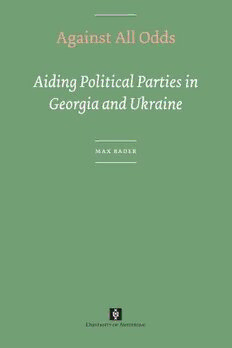
Against All Odds: Aiding Political Parties in Georgia and Ukraine (UvA-Proefschriften) PDF
202 Pages·2010·1.203 MB·English
Most books are stored in the elastic cloud where traffic is expensive. For this reason, we have a limit on daily download.
Preview Against All Odds: Aiding Political Parties in Georgia and Ukraine (UvA-Proefschriften)
Description:
As part of a wider democracy promotion effort, political parties in Georgia and Ukraine, as in most other post-communist states, have received assistance from a number of non-governmental but governmentfunded western organizations for most of the post-communist period. This assistance, however, has persistently failed to contribute to making parties in the two former Soviet republics substantially more stable, democratic, and representative. In searching for an answer to why the assistance has not been more effective, this thesis looks both at the nature of the assistance and the particularities of party politics in Georgia and Ukraine. The thesis argues that, as a consequence of domestic constraints on party development, political parties in Georgia and Ukraine were essentially unsuitable as recipients of party assistance and that, therefore, party assistance was poorly positioned to make an impact.
See more
The list of books you might like
Most books are stored in the elastic cloud where traffic is expensive. For this reason, we have a limit on daily download.
